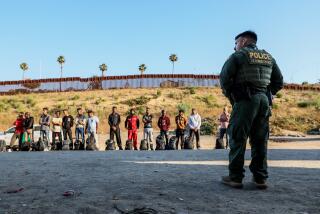Family of Mexican boy killed by Border Patrol agent can sue, judge rules
A federal judge in Arizona has ruled that a Mexican family can sue the Border Patrol over the death of a 16-year-old boy who died in Mexico but was struck by bullets fired from the U.S. side of the border.
Jose Antonio Elena Rodriguez, 16, was shot eight times in the back by Border Patrol Agent Lonnie Swartz on Oct. 12, 2012. Araceli Rodriguez, Jose’s mother, filed a wrongful death suit.
The Border Patrol argued through its agent’s union attorney, Sean Chapman, that Rodriguez had no right to sue in the United States because a Mexican national killed on Mexican soil is not entitled to protections of the U.S. Constitution.
U.S. District Court Judge Raner Collins disagreed. In a ruling handed down late Thursday, Collins ruled that Rodriguez has a 4th Amendment right to challenge the shooting, which Collins said constituted a “seizure” by the Border Patrol because it stopped Jose from moving freely.
The 4th Amendment protects against unreasonable searches and seizures.
Collins’ decision turned on whether the facts as alleged provided grounds to file a lawsuit. Collins noted that the allegations in the lawsuit are based on information from the victim’s family and witnesses and that they remain allegations unless proven in court.
Cross-border shootings have focused anger on the Border Patrol and its ubiquitous presence in border communities. The agency itself, facing criticism for its agents’ actions, absolved agents of criminal misconduct in all but three of 67 shooting incidents that left 19 people dead. The three outstanding cases are pending.
Collins’ ruling contradicts a ruling by another federal court in a similar incident -- a Border Patrol agent in Texas fired shots that killed a 15-year-old Mexican boy while he was running away from the border fence separating El Paso and Ciudad Juarez.
The appeals court ruled the famliy of Sergio Adrian Hernandez Guereca did not have standing to to sue in U.S. courts.
U.S. investigators said the Border Patrol who fired the shots had come under attack by people throwing rocks.
The El Paso case was heard by judges with the 5th Circuit Court of Appeals. Historically, the New Orleans-based 5th Circuit has been considered conservative and the 9th Circuit, predominantly on the West Coast, generally produces more liberal interpretations of the Constitution.
“Applying [Ninth] Circuit’s case law to the facts of this specific case, this court respectfully disagrees with the Fifth Circuit Court of Appeals and arrives at a different conclusion,” Collins said in the decision.
Collins’ decision is another piece of the contradictory puzzle of the rights afforded in U.S. courts to foreigners on foreign soil. The issue has arisen before with Guantanamo Bay detainees, who won the right to habeas corpus in a 2008 Supreme Court decision, and with a Mexican national who lost a challenge to a search of his home in Mexico by U.S. drug enforcement agents.
The agents were represented by attorneys hired by their union, the National Border Patrol Council. Spokesman Shawn Moran said Collins’ decision will more than likely be overturned on appeal, “to bring this decision into line with the 5th Circuit.”
Moran said judicial decisions that question the actions of Border Patrol agents put agents at risk by causing them to hesitate in life-or-death situations.
“This makes their jobs even harder,” Moran said.
Collins’ decision centered on Jose’s status as a civilian engaged in peaceful activity. Witnesses said he was walking home from a basketball game in Nogales, Sonora, when Swartz fired between 15 and 30 rounds from the Arizona side of the border after he came under attack by people throwing rocks. Jose lived within four blocks of the international boundary and had family in the U.S.
The Border Patrol exerts control over the Mexican side of the border simply because its weapons can shoot that far, Collins said, and agents should be cognizant of their responsibility to uphold the 4th Amendment in all areas they control.
“U.S. Border Patrol agents are already trained in the limits of the Fourth Amendment when addressing citizens and non-citizens alike when these individuals place foot within the United States,” Collins wrote. “These agents would require no additional training to determine when it is appropriate to use deadly force against individuals located on the Mexican side of the United States-Mexico border.”
Rodriguez’s attorney, Lee Gelernt, said Friday that Collins’ decision is the only reasonable one.
“Had the decision gone the other way, it frankly would have been impossible to explain to Jose Antonio’s family why the Constitution did not apply to a federal agent firing from U.S. soil,” Gelernt said. “This is a decision that interprets the Constitution in a common-sense fashion.”
Collins also declined to extend qualified immunity to Swartz, who said that he was simply doing his job and that even if Jose had constitutional rights in the U.S., Swartz couldn’t have known that.
Police officers cannot shoot unarmed suspects who are attempting to flee, according to a 1985 Supreme Court decision, and Collins said Swartz should have applied that logic on Oct. 12, 2012.
“This is not a case involving circumstances where Swartz needed to make split-second judgment — in circumstances that are tense, uncertain, and rapidly evolving — about the amount of force that is necessary in a particular situation,” Collins said. “Instead, the facts alleged [demonstrate] an ‘obvious case’ where it is clear that Swartz had no reason to use deadly force against Jose Antonio.”
Follow @nigelduara on Twitter.
More to Read
Sign up for Essential California
The most important California stories and recommendations in your inbox every morning.
You may occasionally receive promotional content from the Los Angeles Times.











